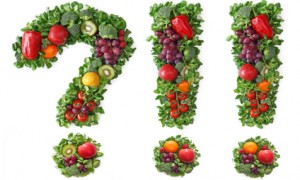
Don’t know whether to believe that news story about nutrition? Can’t tell whether to trust the sales clerk at the nutrition supplement store?
Here are six clues that the nutrition information you’re getting may be bogus:
1. They’re trying to sell you something. A web site, television infomercial, or person who is trying to sell something will say anything to get your money. They may be relying on flawed or incorrect information.
2. They tell you that a certain food, nutrient, supplement, or product will solve all of your problems. There is no magic bullet. There are no superfoods. It’s about your diet as a whole.
3. They tell you that a certain food or nutrient is bad. There are no bad foods or nutrients, either. Any food or nutrient can fit into a healthy diet. It all comes down to how much you eat and how often you eat it.
4. It comes from someone other than a Registered Dietitian. Only Registered Dietitians (R.D.) have earned a bachelor’s degree, completed an internship, and passed a registration exam, all on nutrition. A Registered Dietitian has been trained on how to separate good scientific studies and research from bad ones, and they rely only on the very best scientific studies for their nutrition advice. See below for a list of dietitian-approved sources of nutrition information.
5. They say you don’t need to change your diet in order to lose weight. Permanent, healthy weight loss requires changing your diet.
6. They tell you that you can lose more than two pounds per week. Losing more than two pounds per week is not healthy. And if you lose more than two pounds per week, you will likely gain it all back.
If it sounds too good to be true, then it probably is.
Want more nutrition tips like this? Click here to subscribe to our monthly “What’s Cooking?” newsletter.
Where to find good nutrition information online
Here is a list of dietitian-approved sources of nutrition information.
Academy of Nutrition and Dietetics
www.eatright.org
Choose My Plate
www.choosemyplate.gov
Health Finder
http://tinyurl.com/lzt7ezb
Medline Plus
http://tinyurl.com/yb2z6a4
Center for Science in the Public Interest
www.cspinet.org
American Heart Association
http://tinyurl.com/36tzq4v
American Diabetes Association
http://www.diabetes.org/food-and-fitness/food/
American Cancer Society
http://tinyurl.com/p2nucqw
National Kidney Foundation
https://www.kidney.org/nutrition
HealthCastle – Nutrition advice exclusively from Registered Dietitians
www.healthcastle.com
More on how to spot bad nutrition information
National Institutes of Health: How to Evaluate Health Information on the Internet
http://tinyurl.com/69euxzv
Evaluating Internet Health Information: A Tutorial from the National Library of Medicine
http://tinyurl.com/rgds4
Fake “Flabkiller” ad to teach you how to evaluate nutrition claims. Click on any of the links on the page to learn about how to evaluate nutrition claims and identify scams.
http://www.topmassachusettsdeals.com/Weight-Loss.html
Nutritional Claims (University of Pennsylvania Health System)
http://tinyurl.com/jw66enz
Evaluating Health Web Sites (National Network of Libraries of Medicine)
http://nnlm.gov/outreach/consumer/evalsite.html
Quackwatch: Your Guide to Quackery, Health Fraud, and Intelligent Decisions
www.quackwatch.com
Miracle Health Claims (Federal Trade Commission)
http://tinyurl.com/meolqhq
Why nutrition is so confusing – an excellent article by the New York Times.
http://tinyurl.com/llboaxv
15 ways to tell if that science news story is hogwash
http://tinyurl.com/k52z597
